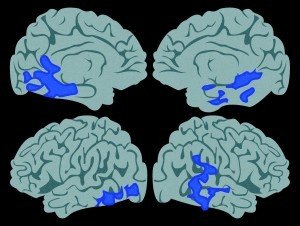B Vitamins Reduce Alzheimer's Disease
We're cracking the vault again, this time to give you Dr. James J. Kenney's take on the latest research about diet, B vitamins, and Alzheimer's... New research suggests that B-vitamin supplements can slow the atrophy of gray matter in the parts of the brain affected by Alzheimer's disease (AD) and dementia. In an earlier, randomized, controlled study on older subjects with mild cognitive, these same researchers found that B-vitamin supplements (800 mcg folic acid, 20 mg pyridoxine, &500 mcg vitamin B-12) slowed the loss of brain tissue over the next 2 years. The present study goes further by demonstrating that B-vitamin treatment reduced, by as much as seven-fold, the loss of the brain's gray matter (GM) regions specifically vulnerable to AD, including in the medial temporal lobe. In the placebo group, an elevated blood homocysteine (Hcy) level at baseline was associated with significantly greater GM atrophy, but this deleterious effect was largely prevented by B-vitamin supplements.Importantly, this study showed that the beneficial effect of B- vitamins was seen only in subjects who initially had an elevated homocysteine (above the median, 11 µmol/L) and were likely deficient of one or more B-vitamins, impairing their ability to metabolize Hcy and suggesting the following chain of events: 1. Elevated Hcy levels in the blood damage GM. 2. B-vitamin supplements lower homocysteine levels in those initially deficient; 3. The reduced Hcy levels then slowed GM atrophy, thereby reducing future loss of GM and slowing loss of cognitive function. Importantly these results showed that B-vitamin supplementation slowed the atrophy of specific brain regions that are a key component of the AD process and that are associated with cognitive decline. The study was published in the May 2013 Proceedings of the National Academy of Sciences [www.pn as.org/lookup/suppl/doi:10.1073/pnas.1301816110/-/DCSupplemental].It should be noted that the B-vitamin cocktail did not reverse the loss of prior cognitive function or restore lost GM, but rather may act to delay the beginning of AD and then slow the progression of the disease process. Hcy is a normal metabolite of sulfur-containing amino acids. Many years ago, it was observed that people who have a genetic defect at metabolizing Hcy have very high levels in their blood and are at much greater risk for developing cardiovascular disease (CVD) and AD. A deficiency of pyridoxine, folate, and/or vitamin B-12 can result in an abnormal increase in blood Hcy levels even in people without this genetic abnormality and so can result in moderately elevated Hcy levels in the blood. Unfortunately, controlled clinical trials with these same B-vitamins lowered Hcy levels in people with advanced CVD but this reduction did not cut their future risk of CVD events. We have long known that risk factors for CVD are similar to those for developing AD and other common forms of senility. What is so exciting about this new data is that lowering Hcy in those with moderately elevated levels (>10µmol/L) with these same B-vitamins did markedly reduce the future loss of functional GM and slows the loss of cognitive function too. Indeed, the results of this small clinical trial show that these B-vitamins work far better than any pharmaceutical agent yet developed to treat or prevent AD. Certainly larger clinical trials are needed to confirm this, but this study does strongly suggest that anyone showing early signs of dementia ought to be tested for Hcy levels and if those levels are elevated, it is likely that they are deficient in one of those B-vitamins and so supplements could be given to correct this deficiency. Hopefully, this will lower serum Hcy levels and slow the loss of functional brain tissue. Certainly the risks associated with these B-vitamin supplements is less than the risks posed by the drugs that are currently used to prevent and treat AD. Plus, the benefits of B-vitamin supplementation may well be much greater.Why did these B-vitamin cocktails not reduce CVD events in those with elevated Hcy levels and advanced CVD? It may be that elevated Hcy levels damage the endothelial cells that line the artery wall. We know such damage is associated with more rapid progression of early atherosclerotic lesions. However, in advanced atherosclerotic lesions, there may too little endothelial function remaining for Hcy lowering to have much impact in those who already have advanced disease. This new research on those at risk of AD showed lowering Hcy did nothing to reverse the damage caused in the past but was successful in slowing the disease in still functioning grey brain matter.Bottom Line: Given the huge cost to society and the devastating effects on individuals and their families caused by AD and vascular dementia, this is indeed very encouraging news. Since these B-vitamins cannot be patented, it is likely that the type of research needed to validate and extend this study will have to be funded by the NIH/NSF, not pharmaceutical companies.By James Kenney, PhD, FACNLooking for more great information like this? We cannot recommend a Communicating Food For Health membership strongly enough. Each month brings you new updates from Dr. Kenney, along with free handouts, recipes, and the latest nutrition research. What are you waiting for? Sign up today!
New research suggests that B-vitamin supplements can slow the atrophy of gray matter in the parts of the brain affected by Alzheimer's disease (AD) and dementia. In an earlier, randomized, controlled study on older subjects with mild cognitive, these same researchers found that B-vitamin supplements (800 mcg folic acid, 20 mg pyridoxine, &500 mcg vitamin B-12) slowed the loss of brain tissue over the next 2 years. The present study goes further by demonstrating that B-vitamin treatment reduced, by as much as seven-fold, the loss of the brain's gray matter (GM) regions specifically vulnerable to AD, including in the medial temporal lobe. In the placebo group, an elevated blood homocysteine (Hcy) level at baseline was associated with significantly greater GM atrophy, but this deleterious effect was largely prevented by B-vitamin supplements.Importantly, this study showed that the beneficial effect of B- vitamins was seen only in subjects who initially had an elevated homocysteine (above the median, 11 µmol/L) and were likely deficient of one or more B-vitamins, impairing their ability to metabolize Hcy and suggesting the following chain of events: 1. Elevated Hcy levels in the blood damage GM. 2. B-vitamin supplements lower homocysteine levels in those initially deficient; 3. The reduced Hcy levels then slowed GM atrophy, thereby reducing future loss of GM and slowing loss of cognitive function. Importantly these results showed that B-vitamin supplementation slowed the atrophy of specific brain regions that are a key component of the AD process and that are associated with cognitive decline. The study was published in the May 2013 Proceedings of the National Academy of Sciences [www.pn as.org/lookup/suppl/doi:10.1073/pnas.1301816110/-/DCSupplemental].It should be noted that the B-vitamin cocktail did not reverse the loss of prior cognitive function or restore lost GM, but rather may act to delay the beginning of AD and then slow the progression of the disease process. Hcy is a normal metabolite of sulfur-containing amino acids. Many years ago, it was observed that people who have a genetic defect at metabolizing Hcy have very high levels in their blood and are at much greater risk for developing cardiovascular disease (CVD) and AD. A deficiency of pyridoxine, folate, and/or vitamin B-12 can result in an abnormal increase in blood Hcy levels even in people without this genetic abnormality and so can result in moderately elevated Hcy levels in the blood. Unfortunately, controlled clinical trials with these same B-vitamins lowered Hcy levels in people with advanced CVD but this reduction did not cut their future risk of CVD events. We have long known that risk factors for CVD are similar to those for developing AD and other common forms of senility. What is so exciting about this new data is that lowering Hcy in those with moderately elevated levels (>10µmol/L) with these same B-vitamins did markedly reduce the future loss of functional GM and slows the loss of cognitive function too. Indeed, the results of this small clinical trial show that these B-vitamins work far better than any pharmaceutical agent yet developed to treat or prevent AD. Certainly larger clinical trials are needed to confirm this, but this study does strongly suggest that anyone showing early signs of dementia ought to be tested for Hcy levels and if those levels are elevated, it is likely that they are deficient in one of those B-vitamins and so supplements could be given to correct this deficiency. Hopefully, this will lower serum Hcy levels and slow the loss of functional brain tissue. Certainly the risks associated with these B-vitamin supplements is less than the risks posed by the drugs that are currently used to prevent and treat AD. Plus, the benefits of B-vitamin supplementation may well be much greater.Why did these B-vitamin cocktails not reduce CVD events in those with elevated Hcy levels and advanced CVD? It may be that elevated Hcy levels damage the endothelial cells that line the artery wall. We know such damage is associated with more rapid progression of early atherosclerotic lesions. However, in advanced atherosclerotic lesions, there may too little endothelial function remaining for Hcy lowering to have much impact in those who already have advanced disease. This new research on those at risk of AD showed lowering Hcy did nothing to reverse the damage caused in the past but was successful in slowing the disease in still functioning grey brain matter.Bottom Line: Given the huge cost to society and the devastating effects on individuals and their families caused by AD and vascular dementia, this is indeed very encouraging news. Since these B-vitamins cannot be patented, it is likely that the type of research needed to validate and extend this study will have to be funded by the NIH/NSF, not pharmaceutical companies.By James Kenney, PhD, FACNLooking for more great information like this? We cannot recommend a Communicating Food For Health membership strongly enough. Each month brings you new updates from Dr. Kenney, along with free handouts, recipes, and the latest nutrition research. What are you waiting for? Sign up today!

